in-review
capespring.: A Review & Conversation
by Franscine Machinda
January 19, 2024
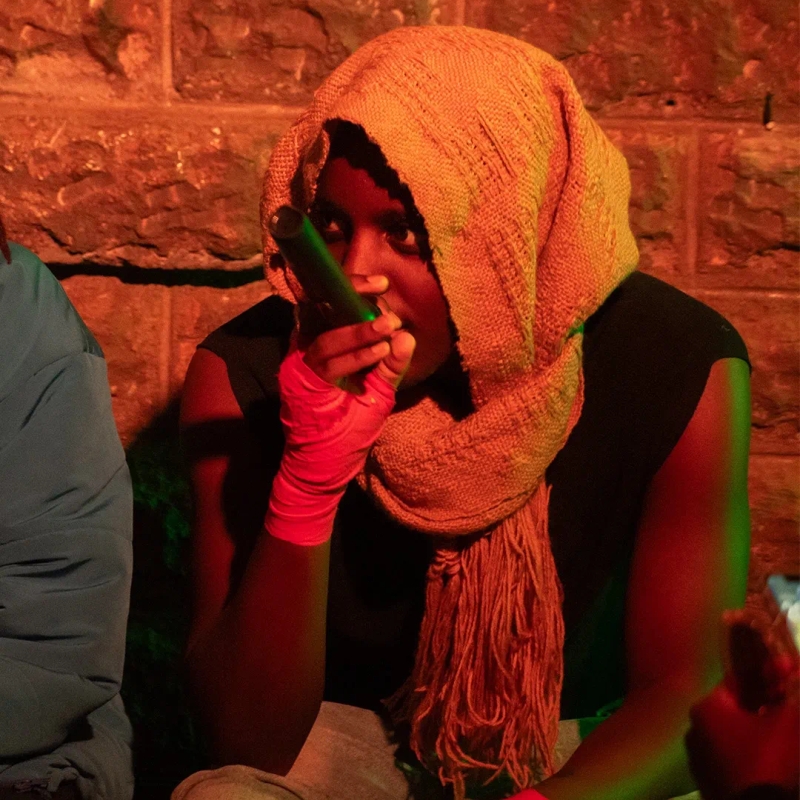
in-review
January 19, 2024

In Review, by Jean Johnson.
capespring. perfectly timed Few & Far Between.
I’m not talking about seasons. I don’t mean he released the perfect summer EP or anything of the sort, but I had just been experiencing what I like to call the visceral journey of love when I heard this. This is why I believe it is the perfect EP to describe the journey of love, not only in his metaphorical flair but also in its jazzy and indie undertones, from beginning to end it sets the tone for an immersive experience that feels like floating through memory lane, looking at all the encompassing experiences you endured with that person or that you are yet to. It seamlessly bends indie, rock and jazz with introspective lyricism and each track unfolds like a chapter. Lyrically, the album delves into themes of self-discovery, love and the passage of time.
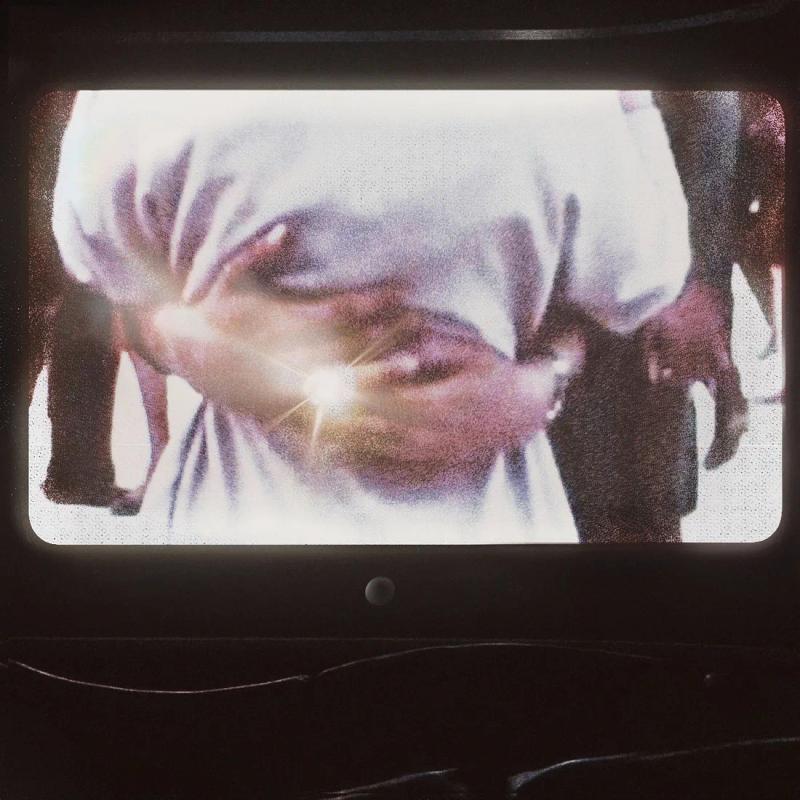
The first track, Jaan, begins with a guitar that transports you to a town square in Barcelona. He sets the tone for the beginning stages of being in love with heartfelt lyrics that explore the emotions of harbouring feelings for somebody. The poignant lines When you’re close to me I feel your love, and it’s only free for me to trust convey a sense of vulnerability and the delicate act of stepping into love. The imagery of the lines Sun goes down, but you’re the afterglow and Morning star, you shine through evening adds a poetic touch, capturing the enduring and luminous qualities of his love. It is a compelling introduction showcasing not only his musical prowess but also their skill in crafting lyrics that resonate with the complexities of love and connection inviting the listener into a sonic and emotional journey.
He follows it up with Burgundy, an enchanting second track that delves into the intricacies of love, expressing a yearning to understand his lover’s thoughts and desires. The lyrics pose questions such as What do you think of me? and What are you thinking? revealing a genuine curiosity about the inner workings of their partner’s mind. It is set against a backdrop of a beautiful piano undertone; the music mirrors the emotional richness of the lyrics. The melody complements the lyrical exploration creating a sonically inducive experience. The piano’s elegance serves as a metaphor symbolizing the effort to craft something as beautiful as the feelings he holds for his lover. As they wonder about the things that make their partner light up, there’s a sincere desire to be the source of joy and fulfilment. He conveys a willingness to transform and shape themselves into something as beautiful as the ideals she dreams of. This cultivated with the sounds makes Burgundy a standout track that enriches the emotional landscape of the album.
In Faith, capespring. embarks on an emotional exploration of the early stages of a relationship’s decline. The lyrics paint a vivid picture of loss, as he reflects on the void left behind by their partner, describing it as an empty space where she used to breathe. This is a powerful motif symbolizing the absence of the once vibrant connection. The Burgundy reference adds a layer of continuity creating a thematic thread throughout the album. The recollection of how her face used to light up like embers on an ashtray fading in and out evokes a sense of nostalgia that captures the fleeting nature of happiness and the bittersweet memories that linger this conveys the complex and changing nature of relationships. He admits that he can’t stop running to these memories, even though they are both inviting and frightening speaking to the emotional pull of the past and the struggle to let go. Faith encapsulates the delicate balance between holding on to cherished memories and the inevitability of moving forward in the face of a changing relationship.
In Father of the Bride, capespring navigates the delicate balance between his senses and his stubbornly lovestruck heart, with a cheeky nod to common sense. I don’t need no common sense to tell me you ain’t right. His senses are waving red flags while his heart continues to throw confetti in celebration typical of when you see the glaring red but shrug it off. He captures the relatable dance between our rational side and the romantic heart that insists following on its own whims. Enter the magnificent beat switch leaving you bopping your head.
There’s a rawness in capespring’s voice in hubris, unveiling a sense of despair and a genuine yearning for answers that resonates with anyone who has grappled with the uncertainties of a relationship. Who’s taking care of your needs? Who’s loving you? The desperation lingers in the air of the ache of love that seems elusive. The arrangement takes on a more subdued quality, emphasizing the gravity of the situation.
Lie/Idle delicately addresses the common ground of conflicts in relationships expressing a genuine desire to avoid unnecessary battles with the admission I don’t wanna fight. It’s that familiar plea we’ve all felt in the throes of emotional turbulence- the wish for the tranquillity we once had amidst the storm. Why couldn’t you be anybody for anybody but me?
The concluding notes of Blissfully Hurting are a moving finale that skilfully navigate the acceptance of a relationship’s end. The opening adds a classic touch with his voice reminiscent of Frank Sinatra echoing the bittersweet realisation of the need to let go after battling with the fight to keep the relationship afloat. Violins gracefully enter the scene, adding a layer of melancholic beauty to the farewell. The meticulous inclusion of footsteps and a closing door paints a vivid auditory scene of the end of a journey. It is a masterful conclusion to the album to Few and Far Between encapsulating the journey of love, loss and self-discovery. He creates a captivating denouement that resonates long after the final notes fade away.
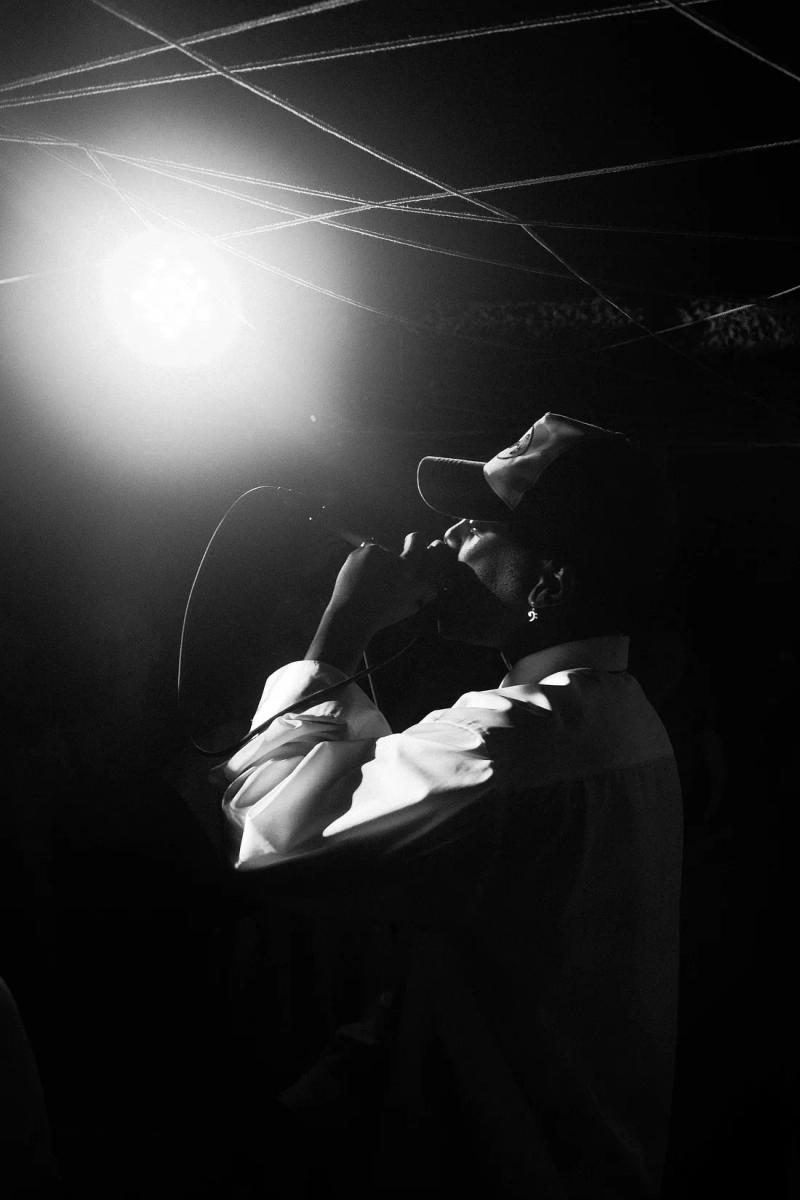
Few & Far Between is not just an EP but an exploration of the human heart, an emotive masterpiece that traverses the spectrum of love’s convolutedness. Coupled with rich melodies, poetic lyricism and emotional honesty, an indelible mark in the indie rock landscape. It is a testament to his talent and a compelling experience for anyone willing to embark on this musical odyssey.
Thank you for 20 minutes and 33 seconds of tears capespring.
Few & Far Between is out on all streaming platforms.
***
In Conversation, with Franscine Machinda.
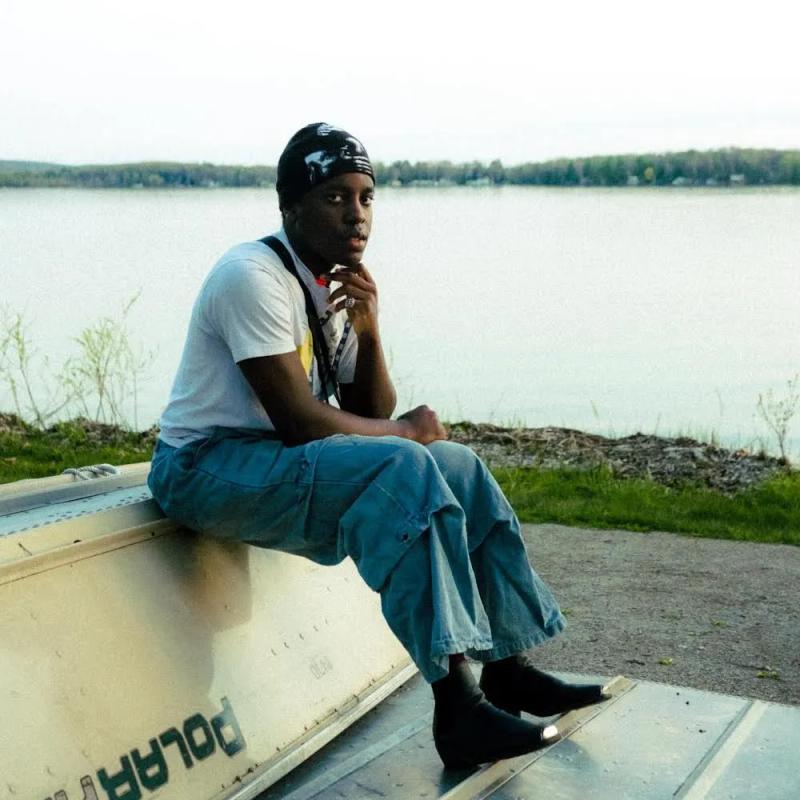
If you asked me to describe an ‘ideal’ artist, how they’d move and talk and interact with their environment, the image I’d conjure would resemble capespring. to an almost unsettling degree. While artists come in countless shapes & forms, while there’s no one way to be a creative, no one way to make art as he expertly reminds us through his latest genre-bending & defying body of work, Few & Far Between, artistry seems so embedded in capespring.’s DNA that he could be a poster child for artistic expression.
His refusal to let the confines of genre dictate his creative process as he plays around with RnB, Jazz & even Electronic sonic elements helps keep his work fresh. Having first heard it last August, I think the EP has aged well — especially with how short it is at only 21 minutes.
This freshness is supported by how almost secretive Few & Far Between feels. capespring. explores a few intimate themes: the nervous elation that comes with falling in love, the realization that losing someone means losing the connections you made through them in Father of the Bride, and even the narcissistic urge to remind someone that no one can take care of them as well as you did after what you had turns sour in the laidback yet still standout track hubris. But even as he digs deep within himself and bares his soul, he manages to keep the most important parts of himself to himself. This is partly because he doesn’t write about personal experiences often as he revealed in a previous conversation.
I spoke to him and found out more about this, his creative process, artistic collaboration, faith, and so much more.
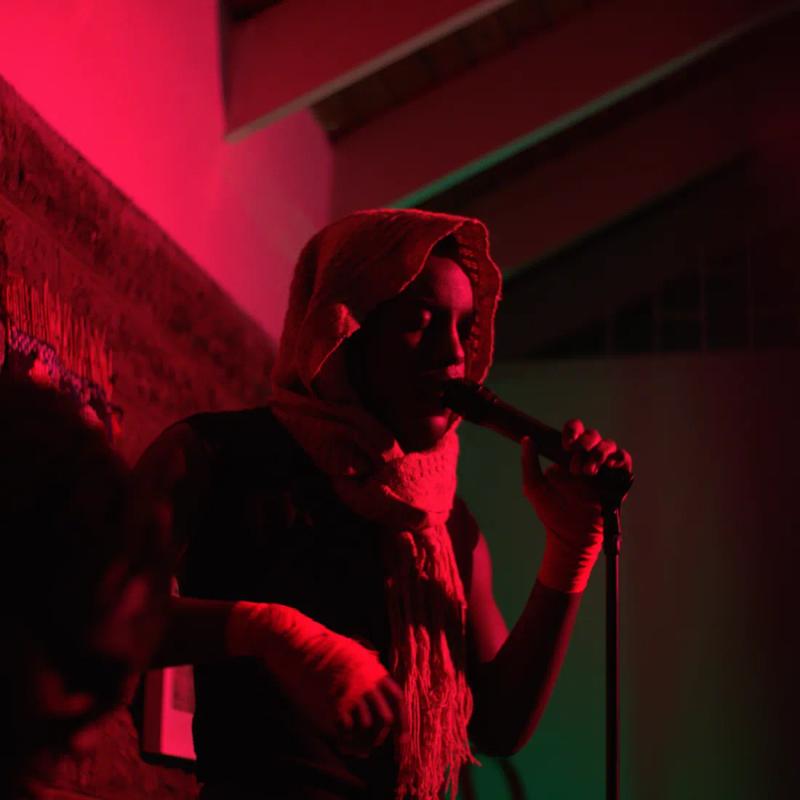
Few & Far Between carries a distinct blend of a few genres. What inspired you to fuse these genres, and how do they help you convey your artistic vision? You’ve also said before that you don’t really take genre into consideration when making music. So is the fusion accidental or are there elements that you think about consciously?
It’s mostly as a result of the music I was listening to, a lot of D’Angelo and various other artists and genres. More than anything, when I’m making a song it’s about the feeling I’m trying to convey, and different musical devices can be used to convey different emotions. Like Jaan is a very sultry song about confessing your attraction to someone and your willingness to be with them and I felt the best way to express that was through something loose and Jazzy. And for something like Father of the Bride, which is a song that, although you might not notice, carries some undertones of frustration and anger at a situation which you can’t really change, but because of the situation you’re losing a lot of people. It’s about how when you’re with someone and you guys eventually break up or things happen, all the friends that you’ve learned to love through them and all the people that you’ve known through them — be it their parents, their family — they stop being family to you once the relationship is over. Or do they, even? And that’s the question the song is trying to ask. “Okay, we’re breaking up, But am I losing you or am I losing your family as well?” The break in that song, the jungle beat break, was really fueled by that frustration and fueled by that, “This is a situation I can’t change, but it’s taking away so much from me.” So it’s definitely more about what different devices have to do with what the song is trying to convey and what feeling.
Yeah there’s for sure a wide range of emotions you go through when you play it front to back. Do you ever take into consideration how those emotions and moods will be received as well or is it just about how you’d best convey them?
I think I definitely make music for me first then think about the consumer after, and even if I end up making things that only I will ever understand the true meaning of, that’s more purposeful for me because then it keeps it going. It keeps it being something that’s like “oh what did he really mean and will we ever figure out what this is about?” But at the same time, I really love to put people in a place where they’re forced to think and they’re forced to feel. Well not necessarily forced, but it’s something that’s unavoidable. Even with the track listing, I definitely arranged the tracks with a lot of intentionality. Like the placement of Father of the Bride which is kind of midway and that break that comes in is like a peak and then everything else from there is downhill; everything before Father of the Bride is the rising limb of the mountain and then everything after is the falling limb. So I think if I did anything to help the consumer receive those emotions it was through the track listing.
And sonically? Would you say sometimes it’s “this would be better received with this sound” just as much as it’s “this emotion would be easier to convey with this other one”?
Yeah, I think sometimes it is about that. I never really think about it in that way though, because when I start making something, I just make it. And I feel like that’s the best service I can do for my work; to just make it the way that it comes. I started realizing recently that my work itself is a whole different entity that also demands its own things. I demand things from music, but music also demands things from me. And so when I’m making something, sometimes it’s just a symbiotic relationship where we depend on each other. There’s times when I have to listen to the music and there’s times that it has to listen to me. So if I’m making a sad song but for some reason the music sounds happy, then sometimes I’ll be okay with it because at least the lyrics and the sound can convey different emotions.
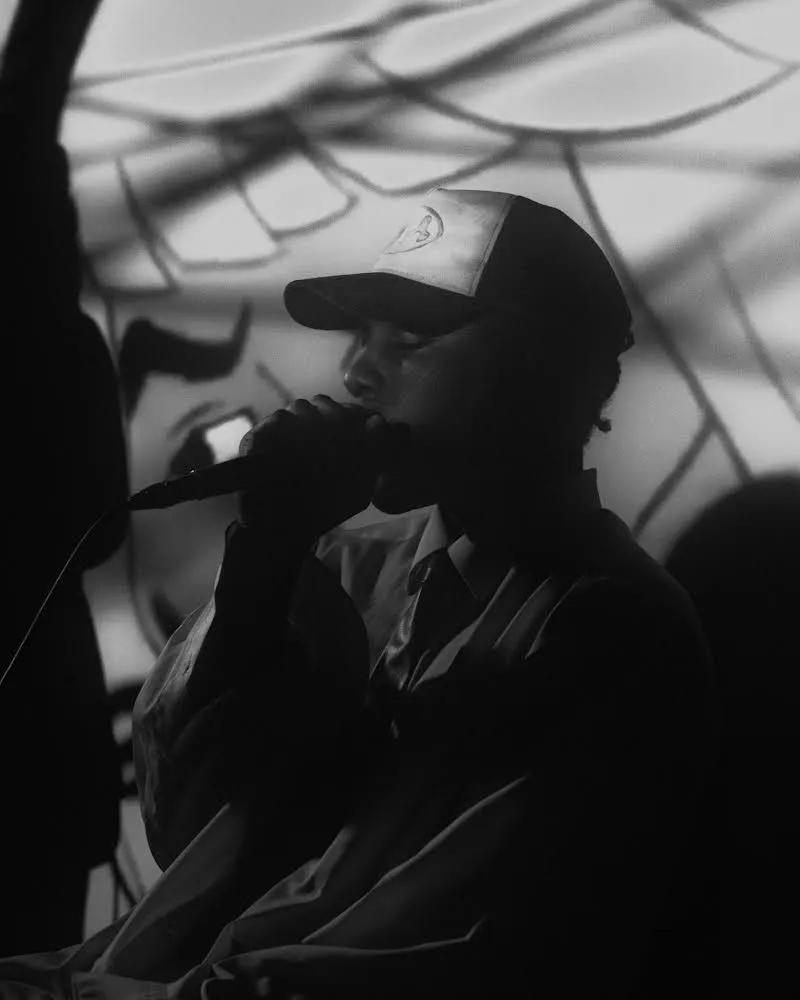
Stunning! How did you approach the songwriting process, and did any particular life event profoundly influence its creation?
I remember the period before I made it, it was during the time I made silk teeth and I was so stuck. I hadn’t made anything in a while, so I re-evaluated the entire process, because before I would make the beat first and then the rest later. I also felt like a lot of my music before this EP, maybe my music from before 2021, was very ingenuine towards who I was as a person. I was talking about stuff that, yes, I can experience, but not really stuff that I want to talk about. Or not in the way I’d want to talk about it. So for this EP, I really had to switch it up. I decided to just write all the lyrics first. Going down the same “music demands things from me” route, I wanted to make the music fit my words and not make my words fit the music, because that way I don’t lose any meaning in what I’m trying to say. There was a period of months, I don’t even remember how long, where I just hadn’t made any music and I was just writing, writing, writing, writing down any idea that came to mind as soon as it did. Then I started sitting down at a piano and just playing around with chords, and as the chords came together, I would try and make a melody with the words I’d written. And then everything molded together to become the songs.
It was much more freeing than making the beat first, because I could go really in depth with imagery, synonyms, emotions, and colors, and everything that is on the EP in terms of lyricism. And I think that’s my biggest achievement for this release. If it’s not the production work or anything, it’s definitely the lyricism and the writing.
Can we talk about the chaos of silk teeth and Father of the Bride? Your music is laid back more often than not. Is that you holding back on the chaos, because you’re clearly capable of conveying violent feelings through your music, or is it, as you’ve said, more whatever happens during the process happens?
I think there was a period of time that I really fell in love with what I call pretty music — which is mostly timid sounds and soft ear candy stuff — and I was and still am fine with that. Then I began exploring a more industrial side to my music when I started listening to more artists like Björk, Massive Attack and Nine Inch Nails — just artists who really pushed what it meant to be Industrial and pushed the envelope of distortion in their music. And there was a point where I was like, okay sometimes there has to be more than just softness, and anger is a real emotion too, and it’s not always a bad thing even though it’s often painted as. I think in a lot of situations it’s a very rational response and I wanted that to be something I can reflect in my music as well.
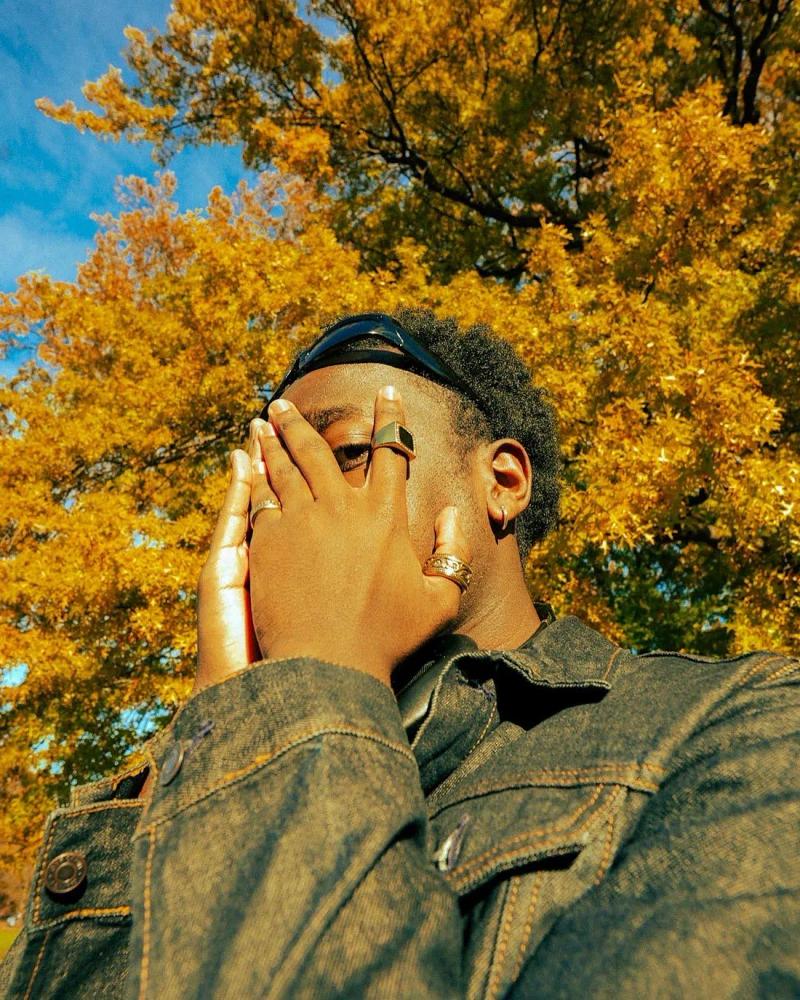
You don’t have any vocal collaborations on this but you’ve had a few before. Are there any sonically and how did they enrich the final product? And was it a conscious decision to not have any vocal collaborations?
Sonically and instrumentally there’s so many collaborations. A lot of my friends played on the record, like the piano on Burgundy is played by my friend Atticus. He’s a great composer and pianist. He actually just gave me that part because we were in the studio and he was like, “yo bro I have this passage that I think you would do really well with.” And it just happened to be arguably one of my most beautiful songs ever. And then on Jaan, my friend Bonham, he’s a classical guitarist, played the whole intro and all the guitar you hear on the track. Even smaller things like on Faith, my friend Case programmed and played some bass on it. Then on Father of the Bride my friend Rourke is the one who played guitar cause I can’t play guitar. That’s actually a pattern with me. Until I learn how to play it, any guitar you hear on a track is a feature. My friend Leo Lee also did the strings on Blissfully Hurting. Sonic collaboration is the most important for me. I love pulling parts of different musicians that I can’t access myself and putting them into the puzzle of whatever my work is going to be. I think the most complete my work will ever get is through collaborations like that.
I think there’s a bit of a ‘Catholic-y’ sound in some of your music. Are you religious, and was that intentional?
Catholic is so interesting. Yeah, I kinda hear it now. But I associate that more with organs and similar instruments. I would say Faith is probably one of the more Catholic ones — with the big harmonies at the start of the song, it feels like something you’d hear like in a Catholic choir, and then the organs. There’s definitely a lot of spiritual elements and sounds influenced by the church, like the layered vocals to sound like choirs. And again with silk teeth, it was a song about how I struggled to fit into religion and love and how those two things interplay in my life and how they fight and sometimes they don’t fight and sometimes they relate. That’s a theme I want to keep carrying in my music cause I’m a Christian, and people have different feelings about it, but I definitely want to keep exploring my religion through my music. And I think incorporating religious undertones like that, it might serve as a Bat-Signal. Like when them niggas put the Batman sign up in the sky, it might serve as that to anyone else who’s struggling with the same things as me. I hope that when they hear that in my music they’re like, okay, maybe this is a safe space for me to think about those things in my life as well.
How has your music and style evolved since your first release? And has it influenced your personal growth? If yes, how? Any valuable lessons learned in the studio that you carried into your day to day? And where do you see your music heading?
My music style has definitely, more than anything, matured. I think it’s a lot more experimental and a lot freer. Probably one of the biggest lessons I’ve learned in the studio, which has reflected and bled into my real life, is that you just have to let things take their shape sometimes. You don’t always have to be in full control of everything and sometimes you have to let things guide you. Sometimes things just take their own shape and I’m learning to be okay with that, because sometimes the music has its own thing it’s trying to say. I’ve also learned to give everything a chance. There’s certain times before when I’d have ideas for my songs while producing and I’d be like, nah. Nowadays I’m a lot more willing to try it, and if it doesn’t work out I can always take it out. And even in real life, I’ve learned that everybody and everything deserves a chance. Not always — there’s obvious situations where that’s not a rule to apply. But yeah, one of the big ones is just give things a chance.
In the future, I just hope to be the same as I am now, if not better. I want to still be more… I want to push envelopes. That’s what I want to do. Like André 3000 just dropped his flute album. I want to reach a point where I can just do stuff like that. That’s like, yeah, I have no regard for like whoever’s going to complain about this. I’m going to do it because this is what feels good to me. That’s the same ethos I want to believe in for the rest of my music journey And I want to just do a lot more orchestral stuff, a lot more soundscape-y orchestral ambient stuff; that’s where I want to go next to be honest — almost cinematic soundtrack-y stuff.
Which film do you think this would be a great soundtrack for?
Marriage Story or Causeway. Especially Causeway. It portrays a relationship that’s so undefined, in which these two people exist in a space where they can hurt each other but the hurt isn’t something they can necessarily be angry about because they’re not officially together. But you can feel their longing for it. And that’s the story of Few & Far Between — the story of love as something scary, something that a lot of people are non-committal towards because of how scary it is, and something that we give up on then come back to.
Your style is very interesting and expressive, even gender-bending. Is that influenced by how you want your audience to view you?
Well, I don’t know if it has more to do with how I want my audience to view me or how I want my audience to view fashion. I think there’s a lot of parallels between my fashion sense and my music, but I also think that fashion in its own right should be androgynous in all senses of the word and in all its forms. Clothes are just fabric and they drape on people differently, but they don’t drape on you a certain way just because you know you identify as this or that. Clothes don’t choose who gets to wear them. Clothes are unbiased, so why should we as people be biased towards them? I think I use that in my music and I use that philosophy for genres. Why should we be biased as to what genres this and that person should be making and why should we confine them to that?
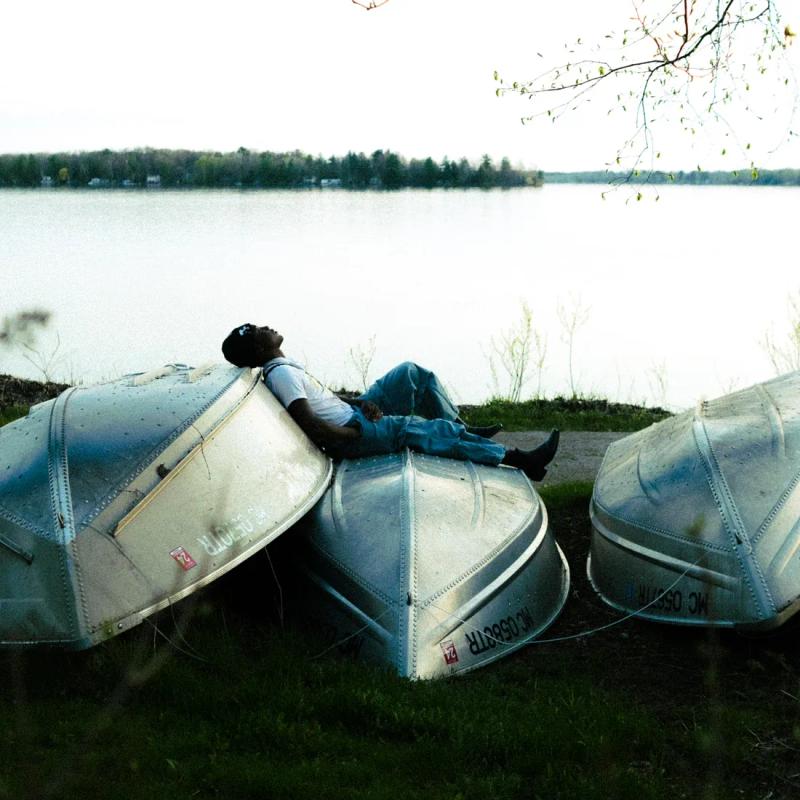
What emotions do you hope your audience feels when listening to Few & Far between, and what message or experience do you want them to take away from it?
I wanted to explore how love is something that’s scary, especially at times when it can be something bigger than us, and I want people to really feel that grandeur of love as a feeling and to feel I guess the confusion and just frustration and everything that can come with trying to love someone for the first time. That’s mostly it.
What inspired the EP and track titles?
For the EP title , I was thinking about this whole idea of love being, again, scary or daunting or something bigger than us. And just the fact that if you really take your time with it and find someone who can make it something worth falling into, those moments in which you find someone like that are few and far between. And that’s why I decided to name it that. Most of the tracks were named after the lyrics in the song. Jaan is a Hindi word that means my life. It’s basically what people call their significant others or their children, like the English version of baby. hubris is when your ego overwhelms you, and I named it that because it talks about when you’re losing someone and you’re gonna and you’re wondering then who’s gonna take care of them the way you did? And who’s gonna make sure all these little details about them are in order in the way that you did?
What’s your favorite lyric(s)?
Definitely the intro of Faith:
“There’s a little bit of faith in me
There’s a little bit of you left where everything used to be
I don’t feel a change
Just an empty space where we used to breathe
I remember how your face lit up
Like embers on an ashtray, fading in and out
And I remember my first love
How you threw me in and out, I flex the corners of my mouth
Remember how we bundled up
With a heavy, heavy heart I’m aching for your love “
And definitely the questions I ask in hubris:
“Who’s taking care of your needs?
Who’s keeping you where you know you should be?
My pretty lover
My morning star
Who’s loving you endlessly
Who pays the price when these wounds cut too deep
Don’t you take another
Take another love from me”
Any sonic moment you’re particularly proud of?
I really really like the transition into acoustic guitar on Burgundy and the strings outro in Blissfully Hurting.
Photos courtesy of Cormac Ajwang, Trevor Sudi, Roark McClellan, and Angela Kwak.